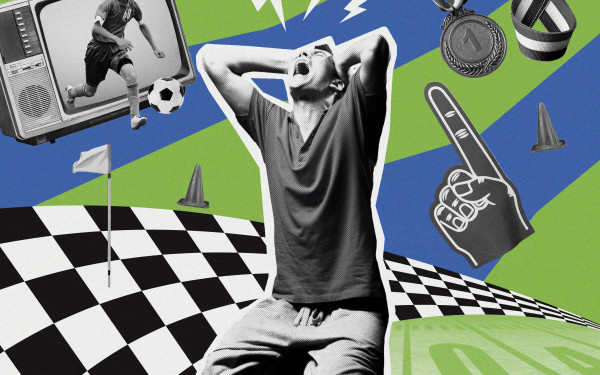Urban Battleground
The Siren Song of Advertising
As I pass the parking front of a fried chicken joint at the corner of Sherbrooke St. and Décarie Blvd., the image of a woman is staring back at me. Her hair is tousled, her hip jutting away in an arching stance. I should mention her jeans, which she is trying to convince me to buy.
On my daily trip from Loyola to Sir George, dozens of billboards, banners and popups yell at me for my attention, in and outside of the bus, on my phone and from every human accessory you can imagine. There is no respite from our omnipresent economy. I will be exposed to hundreds of advertisements today, and everyday, for most of my conscious life in the first world.
There is unquestionably a central need in our lifestyle for advertising. The mass-global market has no way other than mass-communication to get distant producers in contact with an unknown, interested buyer. But with a growing trend in favour of the privatization of social services and infrastructures, most of everything can be sold for profit. Our grip on our autonomy is slacking—slowly, gently, cajoled by the smooth-talking PR of multibillion-dollar men, the sultry eyes of underfed beauty queens.
In 2007, São Paulo officials ruled that 15,000 outdoor advertisements would be stripped, leaving the ninth largest metropolis in the world naked and mute for the first time. Yet somehow, its real voice was only then given the room to be heard. Favelas, previously hidden by enormous billboards, were discovered with surprise. Advertisements’ messages of “buy and be happy” literally blinded the city to the exploitation and neglect of large groups of poor and illiterate humans on which the economic system depends.
We are especially receptive to these messages—the twin of advertising is entertainment. Humans have an almost endless appetite for distraction, a hunger that could not be held back for long in São Paulo. Recently this year, a select few types of advertisements, namely at bus stations, have been renegotiated back into the city limits. A large reason is that the public service of transportation depends more and more on advertisement revenue from the banners within the buses and trains.
The country, like most Western aspiring countries, is gradually renouncing its public assets to the wisdom of the market’s private shareholders. We’ve simply been told too many times it’s in our best interest to continue full-throttle, ignore any moral dissonance, it’ll work itself out—our biggest economic concern right now is a balanced budget. It’s hard to question normality.
Boredom, Isolation, Inactivity and Unconformity are our new deadly sins. We confess in our multiplatform networks of social worship to cleanse ourselves; we are proving to the all-seeing eyes of the public that we are virtuous, active participants engaging with social life. Let me tag you with me, you’re my witness. #realfriends #reallife.
And it must be real, because very important people are saying so. The economist hired by luxury cars and diamond quarries; the general marching to oil drums and ballistics; the prime minister pledging to the privately owned mass media. This is progress, Manifest Destiny, the dogma of success and self-fulfillment. “Money makes the world go round.” If you know someone who is not winning at this game, then they’re bad players—not smart enough, hard working enough, determined enough. The growing rates of depression, anxiety, anger, stress, fear and exhaustion indicate that there are a lot of bad people in this world, not that the problem is organizational, infrastructural.
In case you didn’t know, we just went through the eight symptoms of brainwashing, as defined by Professor Robert Jay Lifton who studied thousands of American prisoners of war after the Korean War. Capitalism, with all of its hyper-consumerist, destructive trappings, is the name of the ideological totalism of our time.
(1) It has complete control of our psychological and physical milieu, saturating everything from our notion of “value” to the shape of our cityscape. (2) We cannot imagine avoiding the mystical manipulation that makes us irrationally consent to and partake in this system of gradual global annihilation. (3) We have strong ideals of wrong and right, success and failure, that only hold up if we are subservient to the bliss of ignorance, avoiding discordant thoughts. (4) To prove that we belong, we become deeply involved in a cult of confession through social media and brand peacocking.
(5) Our doctrine is the sacred science, the unquestionable authority of “experts.” (6) Our mantras are the thought terminating clichés of “technology is progress” and “the American Dream,” “work hard, play hard.” (7) Your personal experience is not a valid counter-argument to the current state of affairs—the Occupy movement is manned by lazy youths and idealist hippies who don’t understand the “real world,” your experience of racial or sexual abuse was bad luck or your fault. (8) And if your hopelessness results in your termination, either as a result of violence or by your own hands, then it’s your own goddamn fault.
Advertisement is the visual language of capitalist propaganda, and it operates on the principles of slow, insidious infiltration through the repetition of simple, emotional, easy-to-remember slogans. Propaganda is a weapon of total control, and history has never seen it used unless there was some Big Lie to hide for the sake of private interests. Out of sight, out of mind: look at this instead.
Today, the girl at the corner of Sherbrooke St. and Décarie Blvd. has been replaced. I can barely tell the difference.

_770_1125_90.jpg)



WEB_600_375_90_s_c1.jpg)
